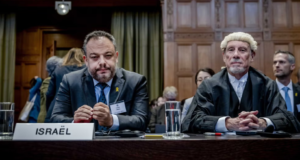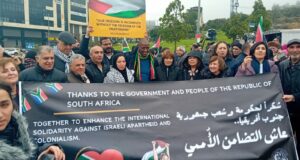10 December 2009

Abdallah Abu Rahmah (right) with Ela Bhatt, Desmond Tutu, Jimmy Carter, Fernando H Cardoso, Mary Robinson and Gro Brundtland of the Elders during their visit to Bil'in
As part of a recent escalation of political arrests in Bil’in, Abdallah Abu Rahmah, a school teacher and coordinator of the Bil’in Popular Committee was arrested by Israeli soldiers.
At 2am on Thursday, 10 December 2009, seven Israeli military jeeps pulled over at Abdallah Abu Rahmah’s home in the city of Ramallah. Soldiers raided the house and arrested Abu Rahmah from his bed in the presence of his wife and three children. Abu Rahmah is a high school teacher in the Latin Patriarchate School in Birzeit near Ramallah and coordinator for the Bil’in Popular Committee against the Wall and Settlements. A previous raid targeting Abu Rahmah on 15 September 2009 was executed with such exceptional violence, that a soldier was subsequently indicted for assault.
Abdallah has been a member of the Bil’in Popular Committee since its conception in 2004. As coordinator, Abu Rahmah not only regularly organizes and attends the weekly Friday demonstrations but does the media work for the Bil’in struggle. Abdallah has represented the village in engagements around the world to further Bil’in’s cause. He has traveled to Montreal to participate in a speaking tour and the village’s legal case against two Canadian companies building settlements on Bil’in’s land in June 2009, and in December of 2008, he participated in a speaking tour in France and traveled to Germany to accept the the Carl von Ossietzky Medal for outstanding service in the realization of basic and human rights, awarded by the board of trustees of the International League for Human Rights on behalf of Bil’in. Abdallah’s endless work for his village is just a part of his incredible persona, many of us know him personally, as he welcomes thousands of international, Palestinian and Israeli activists when they visit Bil’in.
Abu Rahmah’s arrest is part of an escalation in Israeli military’s attempts to break the spirit of the people of Bil’in, their popular leadership, and the popular struggle as a whole – aimed at crushing demonstrations against the Wall. Recently, Adv. Gaby Lasky, who represents many of Bil’in’s detainees, was informed by the military prosecution that the army intends to use legal measures as a means of ending the demonstrations.
Following Abu Rahmah’s arrest, Adv. Lasky, stated that “My client’s arrest is another blatant illustration of the Israeli authorities’ application of legal procedures for the political persecution of Bil’in residents. The Bil’in demonstrators are being systemically targeted while it is the State that is in contempt of a High Court of Justice ruling; a ruling which affirmed that the protesters have justice on their side and instructed 2 years ago that the route of the Wall in the area be changed, which has not been implemented to date.”
Since 23 June 2009, 31 residents of Bil’in have been detained by the military in a wave of night raids and arrests which began concurrently with preliminary hearings in a lawsuit against two Canadian companies responsible for the construction of an Israeli settlement on Bil’in’s land. The Israeli military is targeting protesters and the leadership of Bil’in’s Popular Committee. Apart from Abdallah, three other committee members were arrested, but all of them were released for lack of evidence. In the case of Mohammed Khatib, the court even found some of the presented evidence to be falsified. In addition to committee members, a leading Bil’in activist, Adeeb Abu Rahmah, who has been detained for over five months, is not suspected of committing any violence, but was indicted with a blanket charge of “incitement”, which was very liberally interpreted in this case to include the organizing of grassroots demonstrations.
While they continue their struggle, they need your support.
What can you do?
Attempts to criminalize the leadership of non-violent protests where curbed in the past with the help of an outpouring of support from people committed to justice from all over the world.
- Please protest by contacting your political representatives, as well as your consuls and ambassadors to Israel (http://www.embassiesabroad.com/embassies-of/Israel) to demand that Israel stops targeting non-violent popular resistance and release Abdallah Abu Rahmah and all Bil’in prisoners.
- Organise demonstrations outside of Israeli embassies in your countries in condemnation of Israel’s ongoing arrest campaign against non-violent activists and in solidarity with those who remain in Israel’s prisons (All demonstrations can be coordinated through palreports@gmail.com for media support work).
- The Popular Committee of Bil’in is in desperate need for funds in order to pay legal fees both for the trial in Montréal and for representing the arrested protesters in the military courts and bail. Please donate to the Bil’in legal fund through PayPal. If you would like to make a tax deductible donation in the US or Canada contact: bilinlegal@gmail.com.
The Bil’in Popular Committee Against the Wall and Settlements
Background
Following initial construction of Israel’s wall on Bil’in’s lands in March 2005, residents organized almost daily direct actions and demonstrations against the theft of their lands. Garnering the attention of the international community with their creativity and perseverance, Bil’in has become a symbol for Palestinian popular resistance. Almost five years later, Bil’in continues to have weekly Friday protests.
Located 12 kilometers west of Ramallah and 4 km east of the Green Line, Bil’in is an agricultural village spanning 4,000 dunams (988 acres) with approximately 1,800 residents.
While construction of and opposition to the Wall and began in 2005, the majority of land had been expropriated from Bil’in earlier.
Starting in the early 1980’s, and more significantly in 1991, approximately 56% of Bil’in’s agricultural land was declared ‘State Land’ for the construction of the settlement bloc, Modi’in Illit. Modi’in Illit currently holds the largest settler population of any settlement bloc, with over 42,000 residents and plans to achieve a population of 150,000.
In addition to grassroots organizing, Bil’in has held annual conferences on popular resistance since 2006; providing a forum for activists, academics, and leaders to discuss strategies for the unarmed struggle against the Occupation.
Bil’in embraced legal measures against Israel as part of its multi-lateral resistance to the theft of their livelihoods. The village first turned to the courts in the fall of 2005. Two years after they initiated legal proceedings, the Israeli High Court of Justice ruled that due to illegal construction in part of Modi’in Illit, unfinished housing could not be completed and that the route of the Wall be moved several hundred meters west, returning 25% of Bil’in’s lands to the village. To date, the high court ruling has not been implemented and construction continues.
In July 2008, Bil’in commenced legal proceedings before the Superior Court of Quebec against Green Park International Inc and Green Mount International Inc for their involvement in constructing, marketing and selling residential units in the Mattityahu East section of Modi’in Illit
In an effort to stop the popular resistance in Bil’in, Israeli authorities intimidate demonstrators with physical violence and arrests.
Israeli armed forces have used sound and shock grenades, water cannons, rubber-coated steel bullets, tear-gas grenades, tear-gas canisters, high velocity tear-gas projectiles, 0.22 caliber live ammunition and live ammunition against protesters.
On 17 April 2009, Bassem Abu Rahma was shot with a high-velocity tear gas projectile in the chest by Israeli forces and subsequently died from his wounds at a Ramallah hospital.
Out of the 78 residents who have been arrested in connection to demonstrations against the Wall, 31 were arrested after the beginning of a night raid campaign on 23 June 2009. Israeli armed forces have been regularly invading homes and forcefully searching for demonstration participants, targeting the leaders of the Popular Committee Against the Wall and Settlements, as well as teenage boys accused of throwing stones at the Wall. Thirteen currently remain in detention, five of which are minors.
 International Solidarity Movement Nonviolence. Justice. Freedom.
International Solidarity Movement Nonviolence. Justice. Freedom.


